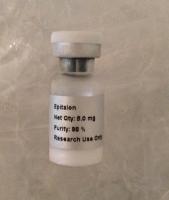I just spent some time messaging with some people on a different forum and reading many posts about Sublingual delivery of peptides. In this case we were talking about GHRH and GHRP peptides. In their experience sublingual simply didn't work for these peptides, it would not cross the membrane. "Sublingual won't work, CJC-1295 is a polypeptide consisting of 29 amino acids*) and, therefore, won't cross any membrane. That's the reason why injection is the only way to go here." Epitalon is a much smaller chain peptide but has anyone done any research to see how much of it actually crosses the membrane when administered sublingual or oral? I'd really like to understand it better.
Also, I think Dreamer is saying there are other people who have injected it subcutaneous and not had any of the side effects that I experienced. Could you please post a couple links to their posts so that I can read up. It really could just be my reaction, or it could be that subcutaneous is much much stronger than sublingual. I'd like to find out more please help and thanks!
I injected Epitalon subcutaneously for a month using the dosage regime on the Clinical Grade Peptides site (150 mcg twice a day). After a two week break I then commenced taking 3 mg per day of the 'group buy' Epitalon sublingually. I have now been doing this for nearly two weeks. The key short term effects I noted with the subcutaneous injections were smoother and apparently healthier skin on my face, healthier feeling hair (less wispy), and a burst of clarity of mind soon after injection. I didn't pay attention to sleep quality, and didn't get more vivid dreams. With the sublingual approach, the smoother and healthier skin on my face has returned (in the two weeks during which I stopped subcutaneous and started sublingual administration, it returned to 'normal'), my hair is similarly healthier, but I don't get the burst of mental clarity. Instead, now that I have given attention to the effects on sleep, I have noticed that I feel more tired after taking the sublingual dose (I take it before bed), and sleep more soundly, at least for six or seven hours straight through, which is better than previously). I haven't noticed any effect on dreams. It could be that the burst of mental clarity that followed subcutaneous injection came from the 'mind stilling' effects of the injection ritual, not from the Epitalon.
So the short-term observable qualitative effects seem similar between the injection of 150 mcg twice a day, and 3 mg taken once a day sublingually. But it is impossible to tell accurately from self-observation whether the effects are similar quantitatively. Furthermore, I am not aware of any precise experimental evidence that identifies how much of the sublingual dose actually gets into the blood stream, or any evidence that establishes 3 mg or anything like that as an optimal sublingual dose.
Furthermore, I can't find any precise information on this site or anywhere else about the actual injection regime used by Khavison when administering Epitalon to humans such as members of the Russian Academy of Science. The limited information available seems to suggest that his regime involved injecting Epitalon for only a limited period during any year, and that there may be detrimental side effects if it is used continuously. But I don't really know. So if anyone has any more accurate information about Khavison's original regime, or about any side effects of continuous dosing, it would be greatly appreciated.































 This topic is locked
This topic is locked

















